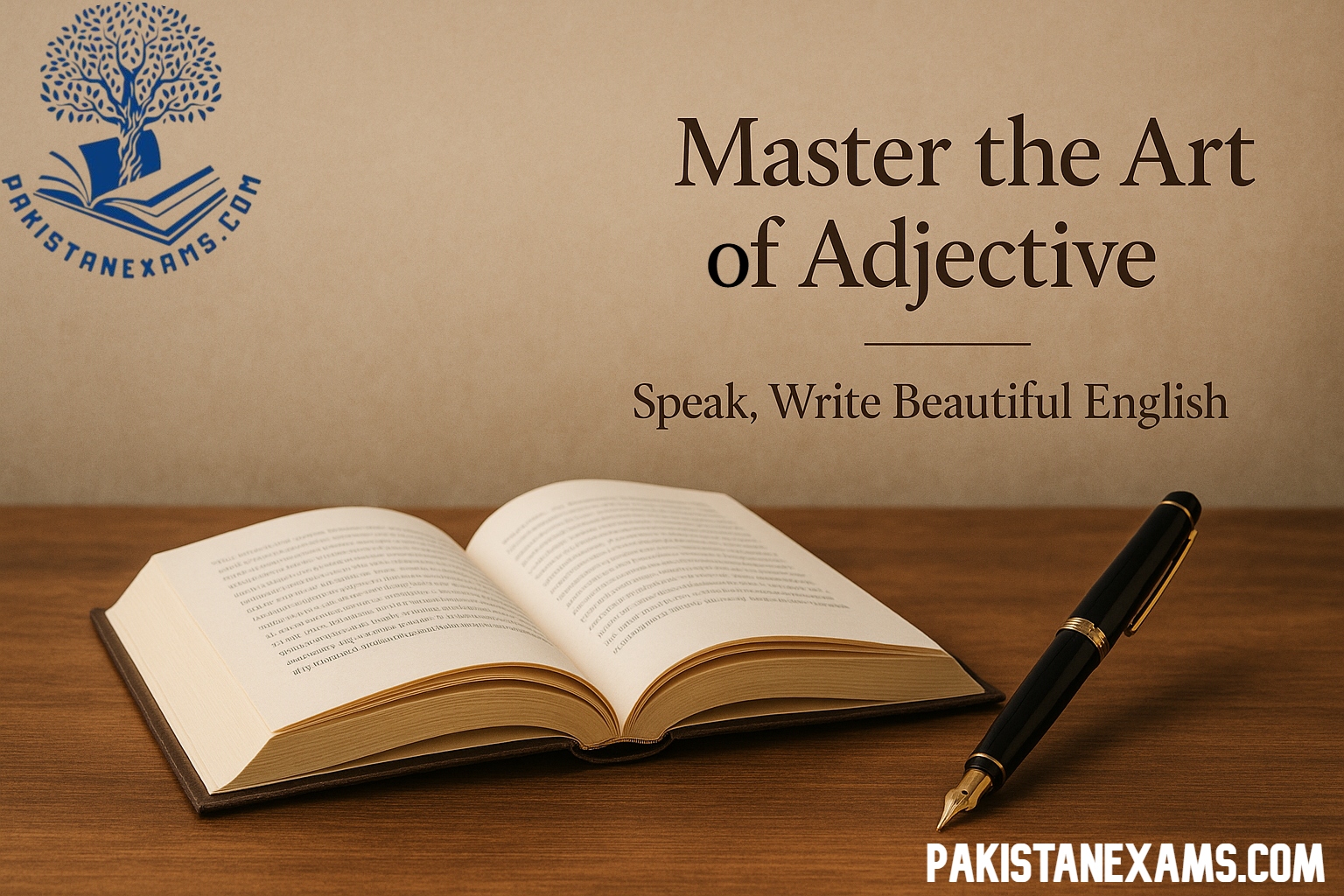An adjective is a word that qualifies a noun or a pronoun. Furthermore, it describes and modifies them. Here, “ad” means added “to”.
E.g.
- A beautiful girl.
- A genius boy.
- An old man, etc.
The words “beautiful”, “genius” and “old” are adjectives. They are describing a girl, a boy and a man.
Why Are Adjectives Important?
They are important in English grammar because they provide crucial information about a noun or pronoun in a sentence. Hence, they guide the reader. Therefore, students need to learn them in order to speak or write beautiful and clear English.
Types of Adjective with Examples
The following are various types of adjectives. Understanding these types are beneficial. The reason is that they help in using them correctly.
Adjective of Quality
It is also known as a descriptive or proper adjective. It answers what kind of a thing, place, or person is.
Examples in Everyday Sentences
- A large city.
- A bad man.
- A bold act.
- An Urdu novel, etc.
The underlined words indicate qualities.
Quantitative Adjective
The other name of this is adjective of quantity. It tells how much thing is meant. Therefore, it gives information about the quantity of nouns.
Practical Usage
- Some rice
- Much patience
- Enough exercise
- All wealth
- No sense
- Any milk
- Great care, etc.
The italicized words show quantities.
Demonstrative Adjective
They point out a specific entity. So they identify nouns.
Common Examples
- This boy
- These books
- That car
- Those trees
- Such people, etc.
Here “this”, “these”, “that”, “those”, and “such” are demonstrative adjectives.
Interrogative Adjectives
People use them for asking questions. Therefore, they are determiners. They help in determining nouns. Remember it always comes before noun. Its structure is WH family + noun. It follows this structure.
The main three interrogative adjectives:
- What – when many answers are possible
- Which – when choices are limited
- Whose – when showing possession or ownership
Usage in Practical Contexts
- What color is the dress?
- What book are you reading?
- What kind of a man are you?
- Which car is yours, this one or that one?
- Which student won the match?
- Whose book is this?
- Whose car is that?
- Whose idea was that?
Emphasizing Adjectives
These are the ones that show double possession or double description of a noun or pronoun. Thus, it adds impact to them. It makes description more forceful.
Important Examples Emphasizing Adjectives
- My own children
- His own pen
- This very book
- The very center of attention
- The same person
- A complete fool
- A complete failure
- A real genius
- A real hero
- Total silence
In these examples, the words “own”, “very”, “same”, “complete”, “real” and “total” are emphasizing on nouns.
Exclamatory Adjectives
These are types that express strong emotion or surprise. They come before a noun and show their feelings. Additionally, they are interrogative adjectives but used to show strange feelings.
Point to note
When interrogative adjectives act as exclamatory adjectives, then they do not ask questions. They simply show feelings.
Important Examples
- Such a shame!
- Such a difficult challenge!
- Such a wonderful person!
- What a beautiful day!
- What a match!
- What terrible news!
Formation of Adjectives
We can form them from nouns, verbs and adjectives.
| From Nouns | |
| Boy | Boyish |
| Care | Careful/careless |
| Fool | Foolish |
| Hope | Hopeful |
| Shame | Shameless |
| Sense | Senseless |
| Gold | golden |
| From Verbs | |
| Tire | Tireless |
| Talk | Talkative |
| Cease | Ceaseless |
| Move | Movement |
| Judge | Judgement |
| Bore | Boring |
| Amaze | Amazing |
| From Adjectives | |
| Tragic | Tragical |
| Magic | Magical |
| Poetic | Poetical |
| Red | Reddish |
| Whole | Wholesome |
| Elder | Elderly |
| Comic | Comical |
Degrees of Adjective
There are three degrees of adjective. They are positive, comparative and superlative.
| Positive Degree | Comparative Degree | Superlative Degree |
| It shows the quality of something in general. | These are higher than positive degree. | Highest of all. Understood truth |
| Sweet | Sweeter | The sweetest |
| Red | Redder | The reddest |
| Brave | Braver | The bravest |
| Cold | Colder | The coldest |
| Good | Better | The best |
| Tall | Taller | The tallest |
Formation of Degrees
By Adding “r”
Add “r” to monosyllabic or unstressed words which are ending in “e”
Fine finer
Brave braver
Wise wiser
Safe safer
Adding “er”
Adding “er” to monosyllabic and unstressed words that are ending without “e”
Cold colder
Sweet sweeter
Fast faster
Fat fatter
Dark darker
By Adding “ier”
Add “ier” to monosyllabic and unstressed words ending in “y”. Here “y” is replaced by “i”.
Busy busier
Crazy crazier
Happy happier
Early earlier
Pretty prettier
Adding “er”
Add “er” to monosyllabic and unstressed words which end with consonants preceded by a vowel.
Mad madder
Sad sadder
Thin thinner
Hot hotter
Fat fatter
Note: Some pattern is followed for superlatives by adding “st”, “est” and “iest”.
Adding “more” and “most”
“More” and “most” are added to polysyllabic words.
Wonderful More wonderful Most wonderful
Interesting More interesting Most interesting
Generous More generous Most generous
Expensive More expensive Most expensive
Valuable More valuable Most valuable
Irregular Degrees
Some adjectives have irregular degrees.
Good better best
Bad worse worst
Less lesser least
Much more most
In inner innermost
Conclusion of Types of Adjectives
In short, adjectives are important in the English language. Further, they describe the quality, quantity and possession of nouns and pronouns. Similarly, an adjective has a number of types and each has a specific task to do. Lastly, understanding the types of help in writing and speaking clear and beautiful English.
And to you, dear reader, if anything is unclear or you have questions, don’t hesitate to leave a comment!

